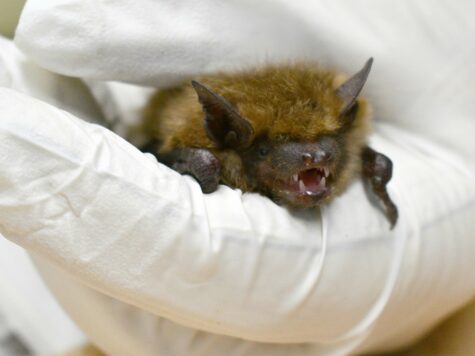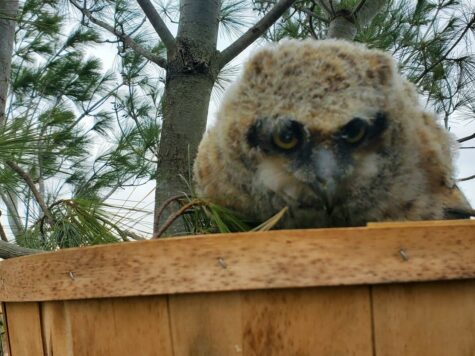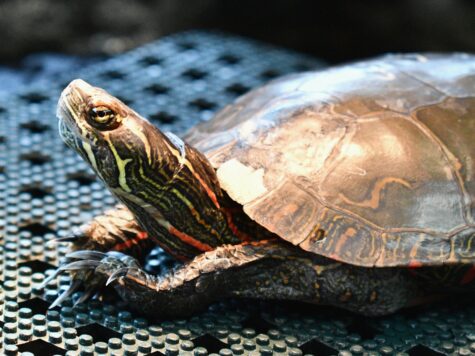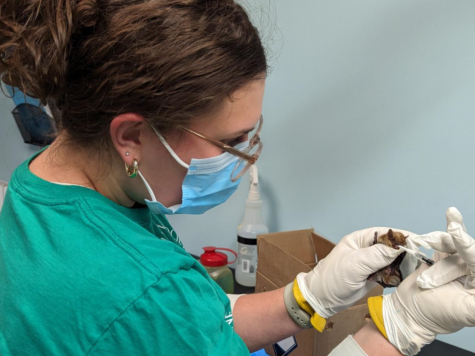Dane County Humane Society’s (DCHS's) Wildlife Center continues to admit red foxes for rehabilitation this year and has now reached the highest number in history with 23 coming in since January 1st, 2022. Most of these admissions were a result of the Highly Pathogenic Avian Influenza (HPAI) virus, a zoonotic disease that primarily affects birds and is naturally transferred by waterfowl such as ducks and geese.
During the spring, an influx of foxes displayed abnormal neurologic signs that were consistent with possible HPAI transmission and were admitted to DCHS's Wildlife Center for rehabilitation. With the help of veterinarians and researchers at the Wisconsin Veterinary Diagnostic Laboratory, testing was approved, and many were found to have contracted the virus. It most likely came from scavenging behaviors when foxes ate infected or deceased birds or eggs.
Many foxes that came to DCHS's Wildlife Center with HPAI symptoms were in critical condition and declining or were unable to recover despite extensive medical intervention and veterinary support. However, a number of others battled hard through the virus and survived!

Five kits were transferred to other local fox rehabilitation specialists in the early part of the season, but as admissions kept rolling in, most license holders in the state became full and no longer had space. At that point, we elected to continue care knowing that staff could offer rapid diagnostic testing and expert treatment.
Six foxes have since been admitted and will remain here through the early fall. Two of them recovered from HPAI and are joined by two other youngsters that came in with separate conditions: one with sarcoptic mange and the other with a broken front limb. Two others were rescued after illegal poaching activity took away their parents, leaving them orphaned. The six will eventually share space to form a full pack with the goal of releasing them as a family unit when they are fit for reintroduction to the wild.
FOX KIT #22-0518
BY PATRICK WANG
In May, a young fox (#22-0518) was found on a Waunakee road with a broken leg. He was quickly brought to DCHS’s Wildlife Center for an evaluation, which revealed multiple additional injuries including lacerations and evidence of sarcoptic mange.
Wildlife rehabilitators went to work, preparing medications and giving supportive care to ensure the kit had the best chance of survival. Almost a week after his admission, the fox underwent a specialized surgery for his broken leg.
Dr. Shawna Hawkins, Wildlife Medicine Program Veterinarian at the University of Wisconsin Veterinary Care Zoological Medicine & Special Species Health Services, took the lead with surgical fixation, inserting multiple pins to help stabilize his humerus. An external fixator helped to keep everything in place until the pins could be carefully removed in early June. Physical therapy helped encourage the fox to use his leg, while additional splinting helped to protect it.

Through the dedication of dozens of staff members, interns, and volunteers, this adorable fox has been making his way through the recovery process. After only six short weeks after admission, this fox kit was able to move to an enclosure where he could meet the other young foxes in our care.
Socialization among kits is critical to their development, so being able to give him access to “new siblings” has helped and has been deemed a massive success. They have been happily playing together since that day, and no aggression has been observed.
Jackie Sandberg is the Wildlife Program Manager at DCHS's Wildlife Center. Patrick Wang is an Assistant Wildlife Rehabilitator at DCHS's Wildlife Center.
20 Years of Helping Wildlife
Help Wild Birds, Fox Kits Heal
In May, DCHS held a Help Me Heal campaign seeking support from our community so DCHS's Wildlife Center could continue providing care to several wildlife species at high risk for HPAI. Our Wildlife Center needed funds for HPAI tests, additional Personal Protective Equipment (PPE) to keep our people and other patients safe, quarantine housing supplies, and additional sanitation items to maintain biosecurity. Thank you to everyone for your generosity!







